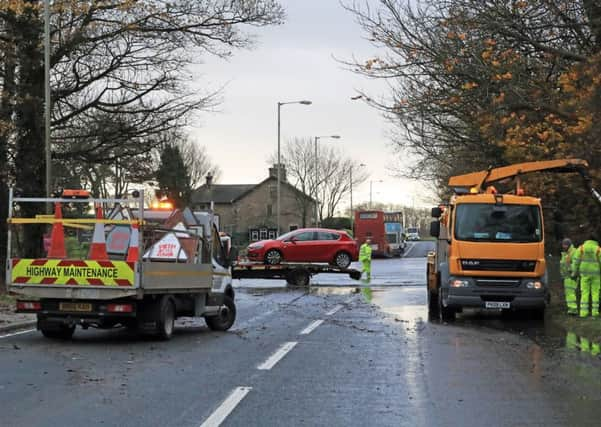Flash flood fears as Lancaster drains fail to cope with heavy rain


A short storm on Saturday caused flooding on roads and in some properties in Lancaster and Halton, as drains failed to cope with the level of rainfall.
Lancashire County Council said the rain overwhelmed the capacity of the drainage system in some places, but the water quickly drained away once it had stopped.
Advertisement
Hide AdAdvertisement
Hide AdCounty Councillor Erica Lewis, who represents Lancaster South East, said that more needed to be done to reduce the effect of further serious flooding in the future.
She said: “It was a very short storm, which saw drains overwhelmed, pavements flood, and a number of houses and businesses have rainwater or sewage enter their premises.
“It is very worrying for residents that a number of places that experienced flash flooding on Saturday were also places that flooded last November.
“Residents and businesses were promised that drains would be cleaned, but either they weren’t, or they weren’t cleared properly, or they need more regular cleaning than they are getting.
Advertisement
Hide AdAdvertisement
Hide Ad“The leaf fall was unseasonal, but the drains that have been left blocked for months and months demonstrate that more resources are needed in this area, and desperately needed before winter.”
She also questioned what plans North West water company United Utilities, which has just cancelled a hosepipe ban this weekend, have to expand the drainage system in Lancaster.
She added: “It’s not unreasonable to expect that drains are clear and working, especially as we move towards winter. Lancashire County Council must commit more resources to ensure drains, across the county, and especially where there is a history of flooding, are clear and working.”
Daniel Herbert, highways manager for Lancashire County Council, said: “There has been some localised flooding in parts of Lancaster caused by a very intense downpour of hailstones and rain, during a short space of time on Saturday evening. This temporarily overwhelmed the capacity of the drainage system in some places, resulting in surface water flooding.
Advertisement
Hide AdAdvertisement
Hide Ad“Our highways team responded quickly to ensure gullies were kept clear as the rain and hail had brought a lot of debris down onto the roads. The water quickly drained away once the rain had stopped. There was some minor damage to the surface of Heaton Road and we’ll repair the surface this week. Our flood risk management team will take forward any further investigations that may be needed as part of our ongoing work to look into the causes of flooding incidents and propose solutions to mitigate future events.”
A spokesperson for United Utilities said: “Intense rainfall in Lancaster over the weekend – in excess of a one in 1000-year storm event – caused a number of flooding events in the area and they have been dealt with by the appropriate authorities.
“United Utilities is only responsible for flooding that emanates from the public sewer system, which can be from foul, surface water or combined sewers. Some of the flooding issues were caused by sewer blockages which we have now cleared.
“We continue to work with key stakeholders such as local authorities and the Environment Agency to reduce the risk of flooding in this area.”
Advertisement
Hide AdAdvertisement
Hide AdIntense bouts of flooding like those seen in the Lancaster district in 2015 and 2017 are set to become more frequent, the Environment Agency has warned.
The warning follows a pattern of severe flooding over the past 10 years linked to an increase in extreme weather events as the country’s climate changes. Met Office records show that since 1910 there have been 17 record-breaking rainfall months or seasons – with nine of them since 2000.